
Baron is a rank of nobility or title of honour, often hereditary, in various European countries, either current or historical. The female equivalent is baroness. Typically, the title denotes an aristocrat who ranks higher than a lord or knight, but lower than a viscount or count. Often, barons hold their fief – their lands and income – directly from the monarch. Barons are less often the vassals of other nobles. In many kingdoms, they were entitled to wear a smaller form of a crown called a coronet.
Capitalization or capitalisation is writing a word with its first letter as a capital letter and the remaining letters in lower case, in writing systems with a case distinction. The term also may refer to the choice of the casing applied to text.
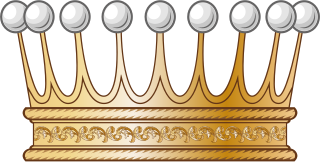
Graf is a historical title of the German nobility and later also of the Russian nobility, usually translated as "count". Considered to be intermediate among noble ranks, the title is often treated as equivalent to the British title of "earl".
Personal names in German-speaking Europe consist of one or several given names and a surname. The Vorname is usually gender-specific. A name is usually cited in the "Western order" of "given name, surname". The most common exceptions are alphabetized list of surnames, e.g. "Bach, Johann Sebastian", as well as some official documents and spoken southern German dialects. In most of this, the German conventions parallel the naming conventions in most of Western and Central Europe, including English, Dutch, Italian, and French. There are some vestiges of a patronymic system as they survive in parts of Eastern Europe and Scandinavia, but these do not form part of the official name.
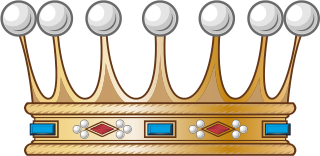
Freiherr, Freifrau and Freiin are designations used as titles of nobility in the German-speaking areas of the Holy Roman Empire and in its various successor states, including Austria, Prussia, Bavaria, Liechtenstein, Luxembourg, etc. Traditionally, it denotes the titled rank within the nobility above Ritter (knight) and Edler and below Graf. The title superseded the earlier medieval form, Edelherr.
Ritter is a designation used as a title of nobility in German-speaking areas. Traditionally it denotes the second-lowest rank within the nobility, standing above "Edler" and below "Freiherr" (Baron). As with most titles and designations within the nobility in German-speaking areas, the rank was hereditary and generally was used with the nobiliary particle of von or zu before a family name.

The Austrian nobility is a status group that was officially abolished in 1919 after the fall of Austria-Hungary. Austria's system of nobility was very similar to that of Germany, as both countries were previously part of the Holy Roman Empire (962–1806).
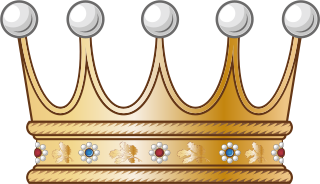
Edler was until 1919 the lowest rank of nobility in Austria-Hungary and Germany, just beneath a Ritter, but above untitled nobles, who used only the nobiliary particle von before their surname. It was mostly given to civil servants and military officers, as well as those upon whom the lower rank of an Order had been conferred. The noun Edler comes from the adjective edel ("noble"), and translated literally means "noble [person]". In accordance with the rules of German grammar, the word can also appear as Edle, Edlem, or Edlen depending on case, gender, and number.
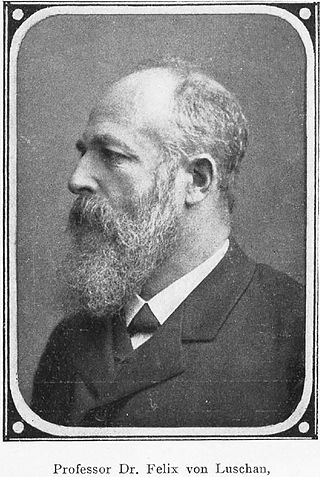
Felix Ritter von Luschan was a medical doctor, anthropologist, explorer, archaeologist and ethnographer born in the Austrian Empire.
The German nobility and royalty were status groups of the medieval society in Central Europe, which enjoyed certain privileges relative to other people under the laws and customs in the German-speaking area, until the beginning of the 20th century. Historically, German entities that recognized or conferred nobility included the Holy Roman Empire (962–1806), the German Confederation (1814–1866), and the German Empire (1871–1918). Chancellor Otto von Bismarck in the German Empire had a policy of expanding his political base by ennobling nouveau riche industrialists and businessmen who had no noble ancestors. The nobility flourished during the dramatic industrialization and urbanization of Germany after 1850. Landowners modernized their estates, and oriented their business to an international market. Many younger sons were positioned in the rapidly growing national and regional civil service bureaucracies, as well as in the officer corps of the military. They acquired not only the technical skills but the necessary education in high prestige German universities that facilitated their success. Many became political leaders of new reform organizations such as agrarian leagues, and pressure groups. The Roman Catholic nobility played a major role in forming the new Centre Party in resistance to Bismarck's anti-Catholic Kulturkampf, while Protestant nobles were similarly active in the Conservative Party.
Count Ludwig Joseph von Boos-Waldeck was a German noble who promoted the settling of Texas by Germans.
Switzerland, officially the Swiss Confederation, is a collection of semi-autonomous cantons. As membership of the confederation has fluctuated throughout history, each of these cantons has its own unique history and nobility. Typically, each canton had its own constitution, currency, jurisdiction, habits, customs, history, and nobility.
A nobiliary particle is a type of onomastic particle used in a surname or family name in many Western cultures to signal the nobility of a family. The particle used varies depending on the country, language and period of time. In some languages, it is the same as a regular prepositional particle that was used in the creation of many surnames. In some countries, it became customary to distinguish the nobiliary particle from the regular one by a different spelling, although in other countries these conventions did not arise, occasionally resulting in ambiguity. The nobiliary particle can often be omitted in everyday speech or certain contexts.
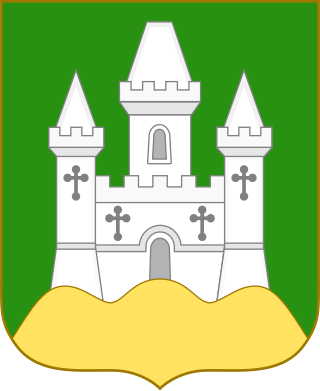
The House of Amsberg is a German noble family of Polabian origin that originated in Mecklenburg and whose agnatic head is the present King of the Netherlands, Willem-Alexander. A great-grandson of a blacksmith and grandson of a baker, parish pastor August Amsberg (1747–1820) started calling himself "von Amsberg" in 1795, and the family's right to use this name was confirmed in 1891 by Frederick Francis III, Grand Duke of Mecklenburg-Schwerin. By this permission to use a nobiliary particle, the family effectively became part of the German untitled lower nobility of the Grand Duchy of Mecklenburg-Schwerin.
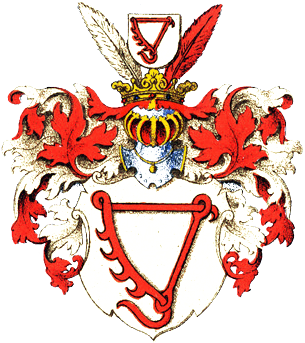
The House of Ketteler is the name of an old and distinguished Baltic German noble family that originated in Westphalia.

The Stackelberg family, also spelled Stakelberg, is the name of an old and influential Baltic German noble family of German origin, represented at the Swedish, Russian and Finnish houses of nobility.
A toponymic surname or habitational surname or byname is a surname or byname derived from a place name, which included names of specific locations, such as the individual's place of origin, residence, or lands that they held, or, more generically, names that were derived from regional topographic features. Surnames derived from landscape/topographic features are also called topographic surnames, e.g., de Montibus, de Ponte/Da Ponte/Dupont, de Castello, de Valle/del Valle, de Porta, de Vinea.

Junker is a noble honorific, derived from Middle High German Juncherre, meaning 'young nobleman' or otherwise 'young lord'. The term is traditionally used throughout the German-speaking, Dutch-speaking and Scandinavian-speaking parts of Europe. It was also used in the Russian Empire due to Baltic German influence, up until the Russian Revolution. The term is currently still in use by the Georgian Defense Forces for student officers of the National Defence Academy.
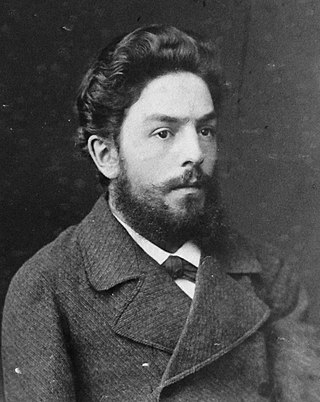
Aleksander Konstantin von der Bellen, later known as Alexander van der Bellen, and called Sascha by family and friends, was a Russian liberal politician and nobleman. He was the grandfather of the Austrian President Alexander Van der Bellen.

The Düben family is a Swedish family originally from Saxony, Holy Roman Empire, whose members were elevated to the Swedish nobility, that rose to prominence with Andreas Düben, an organist to the German Church in Stockholm, Swedish Empire.











